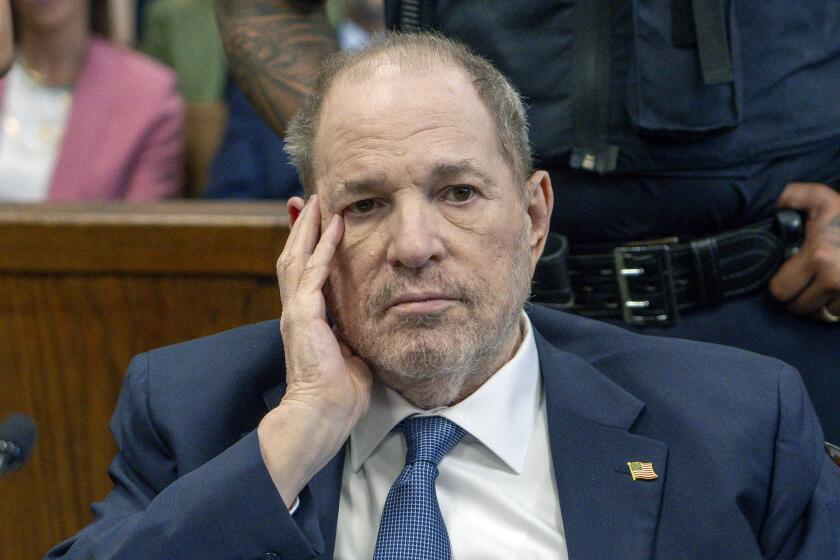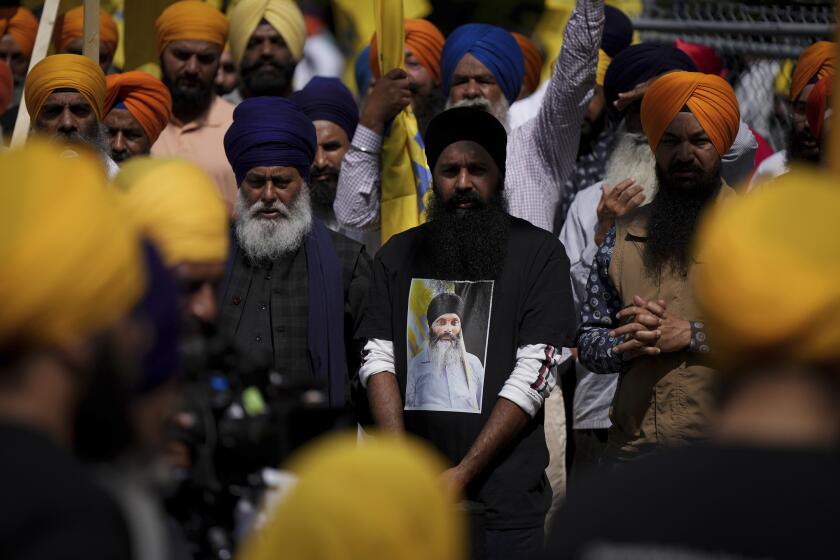Letting the Anger Seep Out
The wide eyes and swollen features, the twitching around the mouth: Anger may be the most frightening of our elemental emotions. Yet many Americans have felt it deeply since Sept. 11 and say the sensation has intruded on their thoughts, affected their relationships and remained surprisingly strong, even months after the events.
“The feeling goes so deep inside, I don’t know if the word ‘anger’ even covers it,” said Joyce Glenn, 50, a Roman Catholic lay minister and peace activist in Omaha.
Marian Gaston, 30, a public defender in San Diego, recognizes the feeling. While talking with her husband about U.S. goals in Afghanistan, she heard herself say: “I don’t care what the goals are, I’m ready to go slit [Osama bin Laden’s] throat myself.” She shuddered at the recollection. “I don’t think I have ever said anything like that.”
In interviews during the last several weeks, dozens of counselors, psychiatrists and clergy across the country said they were seeing evidence of increased anger among clients, friends and neighbors.
“We have seen enormous anger response throughout our whole system,” said James Pruett, executive director of Methodist Counseling and Consultation Services, which runs 18 clinics in the Charlotte, N.C., area. “People are angry that their lives are disrupted, they’re angry when they have to travel, angry at their bosses.” The vast majority connect their anger to the Sept. 11 terrorist attacks on the World Trade Center and the Pentagon, and the aftermath.
Public displays of anger have been numerous: hate crimes against Arab Americans, the spectacle of New York firefighters cursing terrorists on TV, the tremor in the voices of President Bush and other leaders after the attacks. But therapists say most of this passion is playing out in private, in conversations about military strategy and ethics, in arguments among friends, in outbursts after the evening news--eruptions directed at anyone from the Taliban to the U.S. military command to the anchorman.
“I’ve had couples come in, and the woman says, ‘He’s been pounding around the house, talking about bombing things, and I’m scared,’ ” said Dr. William Callahan, an Irvine psychiatrist who was an Air Force flight surgeon and specializes in anger issues.
Callahan’s office has fielded dozens of calls in recent weeks from people whose anxiety and grief are mingled with rising levels of fury. “It’s amazing how many people are terrified by their own anger because they feel they’ll lose control and act on it. But it’s important to know that anger is a normal response. It’s protective, and feeling it deeply does not mean you are going to lose control.”
Contrary to some common depictions, anger is not a state of reckless confusion. In its raw form, it is a sensation of power and clarity that gives us the will and energy to fight for our lives. The body goes on full alert: Levels of “fight-or-flight” hormones such as adrenaline spike, the heart rate quickens, blood rushes to the muscles.
“All senses are heightened, vision is clearer, colors are sharper,” Callahan said. “It has none of the fuzziness that anxiety or stress cause. Anger is a motivator. It wants us to act.”
Scant Research on the Emotion
How we will act as a result of the anger triggered by Sept. 11 is difficult for mental health researchers to predict, because there’s little scientific research to draw on. Anger can be fleeting, and it often is accompanied by a welter of emotions that are nearly impossible to measure: anxiety, fear, grief.
What experts do know is that hostility often is associated with drug use, binge drinking and some mood disorders, including anxiety.
Fits of anger also can knock recovering alcoholics, drug users and smokers off the wagon, according to health professionals. “People tend to make use of such substances as mood regulators, trying to regulate negative moods, and anger is certainly one of those,” said June Tangney, a psychologist who studies anger response at George Mason University in Fairfax, Va.
In the months after the 1995 bombing of the Alfred P. Murrah Federal Building in Oklahoma City, a survey found that 44% of residents there reported feeling angry “very often, fairly often or some of the time,” compared with 35% of those surveyed in Indianapolis, a city of similar size and population distant from the crime.
Compared with the people in Indiana, smokers and drinkers in Oklahoma City were twice as likely to drink and smoke more after the bombing. The rate at which people took up smoking for the first time was four times higher in Oklahoma City.
Already, substance abuse clinics in the New York metropolitan area are reporting increased demand for services and heightened irritability among clients, said Dr. H. Westley Clark, director of the Center for Substance Abuse Treatment, a federal agency that funds U.S. treatment clinics.
“We expect to see this increased demand across the country,” he said. “The fact of the matter is that terrorism can strike anywhere now. This is not like an earthquake or a tornado, which lasts a few seconds or minutes and then it’s over.”
The unprecedented nature of the attacks is what makes thoughts of lashing out so urgent, trauma experts say. The attacks in New York and near Washington, and the anthrax scare that has followed, were not an act of war by one state against another, as was the case at Pearl Harbor. Nor were they an attack on U.S. military forces, such as the bombing of the Marine barracks in Beirut in 1983 or the attack on the destroyer Cole last year in the Yemeni port city of Aden. And unlike the Oklahoma City bombing, the attacks were not an isolated crime after which the perpetrators were quickly caught.
Rather, they seemed to come from nowhere--from the sky, in the mail--creating the sense of vulnerability that often drives people to frustration and fury.
“This is an entirely new phenomenon, as far as I can tell, and my worry is that, if it goes on and on, people will just say ‘Enough!’ and act out,” said Dr. Fred Gusman, director of the education division of the National Center for Post-Traumatic Stress Disorder in Palo Alto. “I don’t think we’ll be able to know what the effects are for a couple of years.”
Meanwhile, millions of Americans are changing their lives to accommodate a sensation far more powerful than they are accustomed to.
“The sight of those people jumping from the towers because they’d rather fall than be burned . . . I just can’t get it out of my head,” said Jack Copas, 47, a Methodist minister and lifelong pacifist in Totowa, N.J. He said that since Sept. 11 he has been more furious than ever before in his life. “I keep asking: Why didn’t they attack at night--when the buildings weren’t full?”
Copas’ anger has prompted him to reassess friendships. One longtime friend, a Christian fundamentalist, recently remarked that the attacks were a great wake-up call from God. “He said, ‘We need to get right with Jesus.’ When he said that to me, I became incensed. I said: ‘This is God? God did this?’ ”
Copas broke off the relationship. His differences with his friend probably were there all along, he suspects, but the response to the attack brought them to the surface.
Gaston, the public defender, has put her anger to practical use. She has been exploring the CIA’s Internet site to see if there is some way she can help in the war on terrorism.
“It makes me laugh,” she said. “I don’t speak any foreign languages; I certainly wouldn’t blend in, and all along I’m thinking, ‘What on Earth am I doing looking at a [Web] site of people I’ve been opposed to all my life?’ ”
For Glenn, the Catholic peace activist in Nebraska, the turmoil of recent months has prompted a rethinking of the principles that have defined her life.
“When it’s a matter of self-preservation, I think we need to ask ourselves when it’s OK to harm others,” she said. While Glenn has not abandoned her commitment to peace, she says she won’t march in local demonstrations against the operation in Afghanistan.
“If I’m going to stand somewhere with a sign that says, ‘peace now,’ I want it to say: ‘stop using planes as weapons; stop using anthrax--peace now.’ If there’s a madman shooting people in McDonald’s, do we have a rally outside saying, ‘peace now’?”
A Counterbalance of Shame
Struggling with the emotion in these ways is far better than trying to ignore it, psychologists say. What often prevents us from acknowledging the depth of our anger, they say, is an equally powerful counterbalance: shame. Revenge fantasies evoke feelings of shame; they seem to reveal an underlying depravity, even mental instability.
“People feel much more comfortable grieving deeply than expressing anger,” said Robert W. Cromey, a former therapist who is rector of Trinity Episcopal Church in San Francisco. “I think the grief that people are pouring out now is deeply related to anger. It’s much more acceptable in our society to be sad than to be really mad.”
Yet having Rambo-like visions after Sept. 11 does not imply anything about a person’s moral character, mental health researchers say.
“There’s part of me that wants to go over [to Afghanistan] and pick up a gun and start killing people,” Gaston said. “But I think it’s important that we not let this attack turn us into something we don’t want to be. On a personal level, I don’t want to be the person wearing a T-shirt showing Osama bin Laden with a target. . . . It seems to trivialize the whole thing.”
More to Read
Start your day right
Sign up for Essential California for news, features and recommendations from the L.A. Times and beyond in your inbox six days a week.
You may occasionally receive promotional content from the Los Angeles Times.






